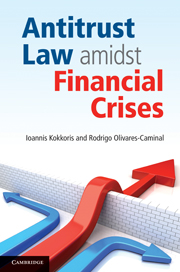Book contents
- Frontmatter
- Contents
- Foreword by Philip Lowe
- Foreword by Frederic Jenny
- Preface
- Table of cases
- Table of treaties and other international instruments
- Introduction
- 1 Introduction to competition law: EU, US and UK
- 2 Some notes on crises
- 3 Failing-firm defence
- 4 Efficiencies
- 5 Crisis cartels
- 6 State aid (Phedon Nicolaides)
- 7 Competition enforcement in periods of crisis
- 8 Conclusion
- Index
4 - Efficiencies
- Frontmatter
- Contents
- Foreword by Philip Lowe
- Foreword by Frederic Jenny
- Preface
- Table of cases
- Table of treaties and other international instruments
- Introduction
- 1 Introduction to competition law: EU, US and UK
- 2 Some notes on crises
- 3 Failing-firm defence
- 4 Efficiencies
- 5 Crisis cartels
- 6 State aid (Phedon Nicolaides)
- 7 Competition enforcement in periods of crisis
- 8 Conclusion
- Index
Summary
Experience with claims of efficiency defences … indicates that efficiencies are often exaggerated and, perhaps even more often, can be achieved through non-merger routes.
Prof. Robert PitofskyIntroduction
Mergers consolidate the ownership and control of business assets, including physical assets (for example, plant) and intangibles (for example, brand reputation). They can enhance corporate – and wider economic – performance by improving the efficiency with which business assets are used. Further reasons for firms to engage in mergers and acquisitions include, as mentioned above, efficiencies, arising from the mergers, and the tendency of some countries to endorse the concept of ‘national champions’.
However, mergers may eliminate any competition that exists between the merging parties and may lead to a reduction in the number of firms competing in the market. Where this reduction has a substantial adverse effect on overall market competition, the market will be less oriented to consumer and efficiency goals, even in the absence of breaches of competition legislation.
Mergers can induce both beneficial and adverse effects on a market. The importance of considering efficiencies in mergers cannot be under-estimated. Efficiencies contribute a great deal towards achieving the goals of an antitrust system – whether promoting consumer welfare or total welfare, or providing genuine benefit to society. In addition, efficiencies which increase competition in the market should unambiguously be encouraged.
- Type
- Chapter
- Information
- Antitrust Law amidst Financial Crises , pp. 214 - 258Publisher: Cambridge University PressPrint publication year: 2010



